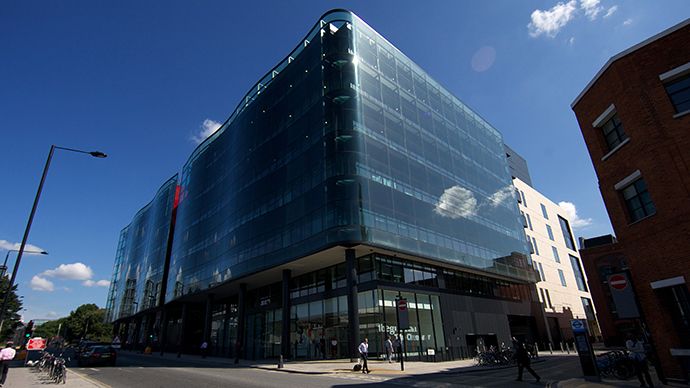 A picture shows the offices of the Guardian newspaper in central London. AFP PhotoBritish secret services threatened to shut down the Guardian newspaper as it was publishing its exposé of US massive surveillance based on Edward Snowden leaks. The story was the most difficult piece of reporting the paper has ever done, rt.com reports.
A picture shows the offices of the Guardian newspaper in central London. AFP PhotoBritish secret services threatened to shut down the Guardian newspaper as it was publishing its exposé of US massive surveillance based on Edward Snowden leaks. The story was the most difficult piece of reporting the paper has ever done, rt.com reports.
“We were threatened that we would be closed down. We were accused of endangering national security and people’s lives. It left us in a very difficult position,” Guardian deputy editor Paul Johnson told the Radiodays Europe conference in Dublin.
A senior civil servant had told the paper’s editor, Alan Rusbridger, that the “prime minister, the deputy prime minister, the foreign secretary, the home secretary and the attorney general have got a problem with you,” Johnson said, as cited by the Irish Times.
The attitude of the British authorities was a sharp contrast to that of the Americans, he said. In the US Snowden leaks led to a nationwide debate on surveillance and privacy while in the UK the authorities just assumed that national security trumps press freedom.
The story, which exposed the scale of electronic surveillance by US National Security Agency and its intelligence allies throughout the world, was probably the most challenging to run in Guardian’s history, the deputy editor told the audience. It was more difficult than reporting on leaked US documents exposed by the whistleblower site WikiLeaks or the phone tapping by the News of the World tabloid.
“It was the most difficult story we have ever done and that includes WikiLeaks, because reporters and editors couldn’t speak to each other. We could only speak using encryption systems,” he said.
The paper had to install a secure room with new computers and a guard standing 24/7 at the door for the work on the story.
Edward Snowden, a former NSA contractor, leaked troves of classified files to leading media outlets exposing the scope of US surveillance programs and the fact that they targeted millions of common people, world leaders - including those of countries allied with America – and key businesses.
After getting stranded in a Moscow airport due to his passport being revoked by Washington, the whistleblower applied and received temporary political asylum in Russia.
While many officials branded Snowden a traitor, he also has numerous supporters who see him as a champion of human rights.
 В Атырау -10
В Атырау -10